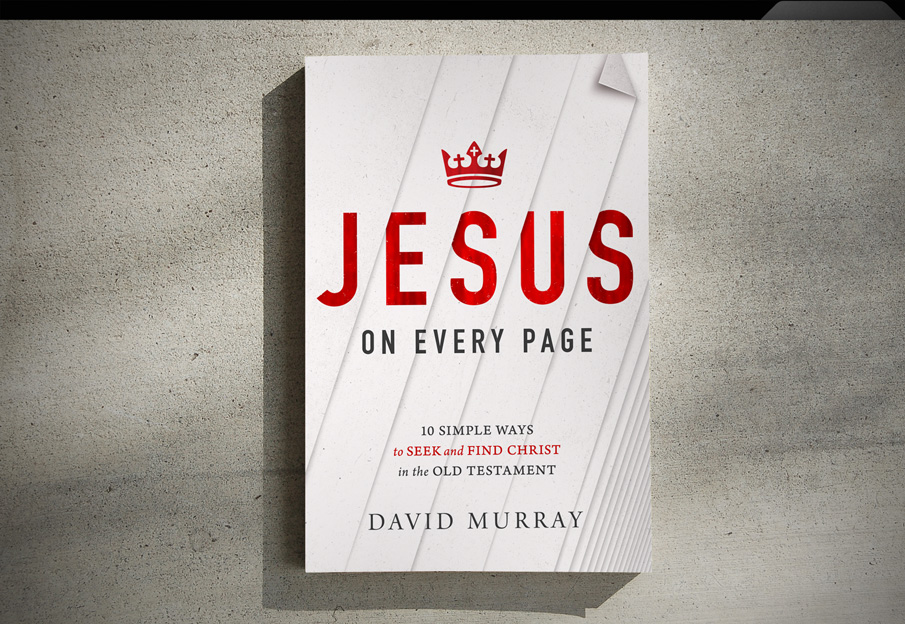I’ve made it my goal over my Winter Break to read and digest a large quantity of books in a short period of time. It’s my pleasure to now write about one of these books, Jesus on Every Page by David Murray. This book has been on my list since it came out earlier this year, and I was very excited to finally get to read it.
The goal of Murray’s book is to overview 10 ways to see Christ throughout the Old Testament. Those various ways are listed below:
1. In the Creation
2. In the Old Testament Characters
3. In His Old Testament Appearances
4. In the Old Testament Law
5. In Old Testament History
6. In the Old Testament Prophets
7. In the Old Testament Types
8. In the Old Testament Covenants
9. In the Old Testament Proverbs
10. In the Old Testament Poems
Why This Book?
This book comes at a time where it is needed now more than ever. The Evangelical church is in a state where the Old Testament is hardly referenced, and when it is it is most often for morals or character examples rather than pointing to Christ. Not only for this reason, but David Murray also points out other reasons why a revitalization of the Old Testament in the Evangelical church is needed:
1. Liberal scholars have created an environment of skepticism and doubt shrouding the Old Testament.
2. Many Christians are ignorant of the Old Testament’s purpose and historical setting.
3. Still others find the Old Testament to be irrelevant in light of the New Testament.
4. The primacy of Dispensationalism in Evangelical churches tends to relegate the Old Testament to a minor role.
5. There are so many bad examples of Old Testament preaching that fuels peoples lack of interest.
6. Laziness.
7. People think the Old Testament is official, not personal (pgs. 6-7).
Interactions with the Text
It would be difficult to go in depth about each of the chapters in this book without writing at length or writing multiple posts. Instead I’d like to just write about a few moments (of many) that stuck out to me in the text and hope that is both informative for you as a reader and convincing enough to buy the book for yourself.
One thing that immediately jumped out to me is in the opening chapter on seeing Jesus in the creation. I was delighted to finally read a book that doesn’t turn Genesis 1-2 into a debate about creation or evolution, but instead teaches its intent for us as readers to see: the glory and majesty of Christ as creator and ruler over all of creation. Murray communicates this thought intimately and beautifully as he lists out the aspects of creation that point to Christ. A section I found really personal was titled “The Accessories of Redemption,” which discusses aspects of the creation that will ultimately be used as part of the plan to redemption. I’ve never thought about the creation with such questions as “What did he (Christ) think when he made the trees, one of which would one day suspend him between heaven and earth? (pg. 47)” When we think of all Christ did in creation despite his foreknowledge of our rebellion, we learn so much about his character and love for us.
I also appreciated David’s approach to the Old Testament characters. One thing is for sure: more often than not we tend to preach the Old Testament in a very man-centered fashion. This approach says we need to have faith like Abraham, forgive like Joseph, and have strength like David. In contrast, Murray shows us how we should instead read the Old Testament characters of old as shadows, types and pointing to Christ and his character. This approach leads us away from man-centered moralism and instead to Christ-centered doxology.
I was also overjoyed to see a chapter on the Old Testament appearances of Christ, also known as theophanies or christophanies. It is wise to learn and observe that when God reveals himself or speaks in the Old Testament it is always through the Son. Charles Drew refers to these appearances as love letters or phone calls between two lovers, acts which are temporary and create anticipation for the genuine arrival (pg. 81-82). Or, as some of Murray’s Scottish friends have said, “Christ enjoyed trying on the clothes of his incarnation.”
Another discussion that would benefit many people is that of Christ as the Wisdom spoken of in the book of Proverbs. It would be unwise for me to go into lengthy discussion on this chapter, but I was awed at how the Proverbs continually point to Jesus Christ.
Like many great books, this text comes complete with a Scripture Index. This index is particularly helpful because it will be useful for future reference to find quick points, introductions and illustrations. In addition, the book contains sets of study questions for each chapter than could be used in a group context.
The only critique I would have for this book is not the content, but a preference about the style. Murray often references Scripture or various commentaries and sources through the use of footnotes. However, instead of including these footnotes on the bottom of the page they are located in the back of the book. I would have much rather seen these footnotes cited on the bottom of the page, particularly for the scripture references that are either paraphrased or not quoted directly.
All in all this is a great book and one that I would heartily recommend to anyone who struggles reading through the Old Testament or wants to pick up new pointers on seeing Jesus in the Old Testament text. While a short primer on the subject matter, it will continue to be a book I delve into for pointers and advice as I read through the Old Testament.
What Jesus Didn’t Say:
- By this all people will know that you are my disciples…by your affinity for gun control laws.
- By this all people will know that you are my disciples…by your listening to Christian radio.
- By this all people will know that you are my disciples…by which church you go to.
- By this all people will know that you are my disciples…by your stance on homosexuality.
- By this all people will know that you are my disciples…by your involvement in politics.
- By this all people will know that you are my disciples…by your memorization of the Bible.
- By this all people will know that you are my disciples…by your Christian Facebook/Twitter posts.
- By this all people will know that you are my disciples…by your t-shirts.
- By this all people will know that you are my disciples…by your ability to articulate the points of TULIP.
- …or by your ability to articulate AGAINST the points of TULIP.
- By this all people will know that you are my disciples…by the Christian conferences you attend.
- By this all people will know that you are my disciples…by how much you serve in the church.
- By this all people will know that you are my disciples…by how many books you read.
- By this all people will know that you are my disciples…by your decision to go to a Christian college.
- By this all people will know that you are my disciples…by your practice of Dave Ramsey’s financial tips.
- By this all people will know that you are my disciples…by your ability to articulate whats wrong with every other church.
- By this all people will know that you are my disciples…by your Facebook/Youtube/CNN internet arguments.
- By this all people will know that you are my disciples…by your “Bend Over Obama” bumper sticker next to a “Jesus fish.”
- By this all people will know that you are my disciples…by the size of your church.
What Jesus Did Say:
By this all people will know that you are my disciples, if you have love for one another. – John 13:35
“My Study Bible notes say…”
“Well, MY Study Bible notes say…so I think..”
“MY Study Bible has history scholars in it and THEY say..so I think…”
A typical weeknight Bible study session. Or should I say, a Study Bible session.
The modern church has a deep-rooted but easily blinded problem: biblical illiteracy. In an age where the answers to our questions are just a Google search away, we quickly rely on whatever answers we can access the fastest. We look for answers before we know what question we are even asking, and readily accept information about the Bible before we’ve critically read the Bible for ourselves. We become a slave to what other people say about the text, rather than learning how to read for ourselves.
One of the worst culprits of this phenomena are Study Bibles. Now please don’t misunderstand me; I love Study Bibles, and I love all of the internet resources readily available at our fingertips. We truly live in a time where we are gifted with far more information than we know what to do with. The problem arises when we quickly accept all of this information without learning how to work for ourselves.
A church who does not engage critically with the Bible text themselves is a church who knows Bible facts without having a Bible heart. There is no life in facts. The Holy Spirit rewards us and brings us life and joy through our work and effort with the text, not in quick Google searches and Study Bible look-ups of the facts. We are unable to really respond to peoples questions and oppositions to a Christian worldview because we ourselves are just walking fact machines. We learn to rely on resources to answer peoples questions and not the Bible itself. Does Scripture say that it is Gods Word or resources about Gods Word that are useful for all things, including teaching and rebuke?
I’m not at all arguing for the elimination or removal of resources like commentaries and Study Bibles, quite the opposite as a matter of fact. Instead I am arguing for the church to learn where the proper place is for these resources. We should use these resources after we have learned how to think critically about the text for ourselves, not before.
Below are some suggestions I have for individuals and the church that I think would not only benefit our minds but our hearts. Learning how to think critically about the Bible for ourselves can only serve to increase our affections for Jesus.
1. Learn how to ask the right questions. God could’ve chosen not to leave any form of communication with us, but instead he left us the Bible. When we pause to think about that, our desire should be to learn how to interact with it! Here are some questions that might help you engage with the Biblical text:
– How does this passage or topic fit into the grand narrative of scripture (Creation, Fall, Redemption, Restoration)?
– What is distinctively Christian about how I am reading this passage or engaging this topic? Note: Our Bible studies, sermons and readings are not Christian because they use the name of Jesus or reference scripture. Cults, heretics and even atheists can do that.
– What does this passage or topic tell me about Jesus?
– Does this passage or topic point forward to the cross, backward to the cross, or forward to Christ’s return? How?
– How does this passage or topic equip God’s people to live on mission?
2. Put down the Study Bible, turn off the internet and engage just with the Biblical text. Allow time for the Bible to speak for itself, engage and think about everything you know in light of the current text. After you’ve spent time engaging with the text on its own, make a list of your questions that remain unanswered. Then take these questions and open your Study Bible, internet resources and commentaries.
3. Leave the Study Bible at home. When we bring our Study Bibles to church gatherings, sermons and Bible studies the temptation is to rely on our notes rather than engage with others on the text.
4. Churches: teach your people HOW to ask the questions. One of the primary responsibilities of a local church should be teaching her people how to engage with God’s written Word.
5. Try to read at least one resource a year on engaging with the Bible. Here are a few recommendations:
– The God who is There: Finding Your Place in God’s Story by D.A. Carson
– From Creation to New Creation: Making Sense of the Whole Bible Story by Tim Chester
– Jesus on Every Page by David Murray
– New Testament Exegesis by Gordon Fee

Photo Credit: h.koppdelaney via Compfight cc
I am an introvert. I always have been. I took the Myers-Briggs test a few years ago and my strongest pull was in the introvert category. Since that time, I’ve always felt like the label ‘introvert’ has a negative stigma surrounding it; like culture only positively receives extroverted and outgoing people. I’ve often tried to avoid this label, or make myself become an extrovert. If you’ve been around the church awhile, you’ve probably heard plenty of sermons or read plenty of books about how Christians are meant to be compassionate, outgoing, engaging, well-spoken and constantly extending hospitality to others. I think the picture often painted in churches is more of what an extrovert looks like in the church, and not necessarily how each of us can uniquely glorify God with how he has created us.
What that means for me is I’ve often felt like my strong tendency to wax introvert is more of a disease than a personality trait. I’ve always been aware that I can be received as shy, socially awkward, or hard to get to know. I’m near the bottom of the list when it comes to asking others to spend time with me. People wear me out, and when I come home from church on Sundays I tend to feel exhausted. I dislike being in a room with a lot of people, and I’m more comfortable talking TO a crowd than I am being IN a crowd. I prefer a quiet corner of a party over the main room. It is really, really difficult for me to talk to people – regardless of how well I know them. I much more enjoy quietly setting up or tearing down our church than I do having to actively engage with people. I often don’t mind standing or eating with people in silence; that is normal for me. I like having “me” time, it’s how my batteries recharge. Workouts by myself, time spent alone watching or reading something is how I think and energize myself.
You see, it’s not that I think being outgoing, engaging, hospitable or conversational are bad things or that I don’t like to do them. It’s not that I don’t like being around people. It’s not that I’m shy, rude or socially awkward. I am a lot of things, but those aren’t really the words I would use to describe myself. Some people might think I don’t have much to say; on the contrary I have quite a bit to say (have you seen my Facebook or read my blog?)! I love people, and I love talking to them about Jesus. I love sharing the gospel with people. The thing is, these activities and forms of communication both terrify and exhaust me. When I hear about doing them, the stress of thinking about being terrified and exhausted in turn makes me exhausted.
In light of what is often spoken of in churches and how culture tends to receive people, I’ve struggled with feelings that there was something socially and culturally off about me.
This is especially difficult as someone who wants to pursue full-time ministry opportunities in the future. If this is who I am, can I really be someone who God can use in ministry? More often than not, it seems like those whom God uses are the “go-getters.” If it’s hard for me to actively spend time with people, how could I ever minister or pastor someone well? These factors continually and constantly build up doubt and shame in my mind.
I’ve been thankful and blessed recently by some blog posts by Thom Rainer (president of Lifeway) and Ron Edmonson (pastor and church planter). Both of them are strong introverts like myself and have written and discussed much in the way of being an introvert in ministry. They have helped me see I’m not alone, and helped me realize that just like anyone else I am “fearfully and wonderfully made” (Psalm 139:14), and that God through his Holy Spirit has appointed me uniquely with gifts to serve the common good (1 Corinthians 12).
I am reminded of Moses prior to his journey to Egypt. When God appeared to him to tell him that he would be the one to deliver his people from bondage and slavery, Moses resisted. While some might think Moses as foolish for resisting God, his reasoning makes a lot of sense to me:
But Moses said to the LORD, “Oh, my Lord, I am not eloquent, either in the past or since you have spoken to your servant, but I am slow of speech and of tongue…Oh, my Lord, please send someone else.” – Exodus 4:10, 13
I look at this line and can’t help but think Moses was an introvert. He wasn’t what some might call a “people-person.” It was hard for him to talk to other people. But God doesn’t make mistakes, and chooses people for very specific reasons:
Then the LORD said to him, “Who has made man’s mouth? Who makes him mute, or deaf, or seeing, or blind? Is it not I, the LORD? Now therefore go, and I will be with your mouth and teach you what you shall speak.” – Exodus 4:11-12
God chose Moses not because of his strengths but in spite of them. This is a comfort for me and I hope it is for anyone else who has these personality traits. My service to God – whether in full-time ministry or not – may look different than some or most, but he has chosen me uniquely to serve his kingdom in some way. Not because I am strong, but because Christ is strong.
Help me, Oh Lord, to be content with who you’ve created me to be in light of who you are. Help me to have a willing heart to serve you not because of my strengths but in spite of them.






